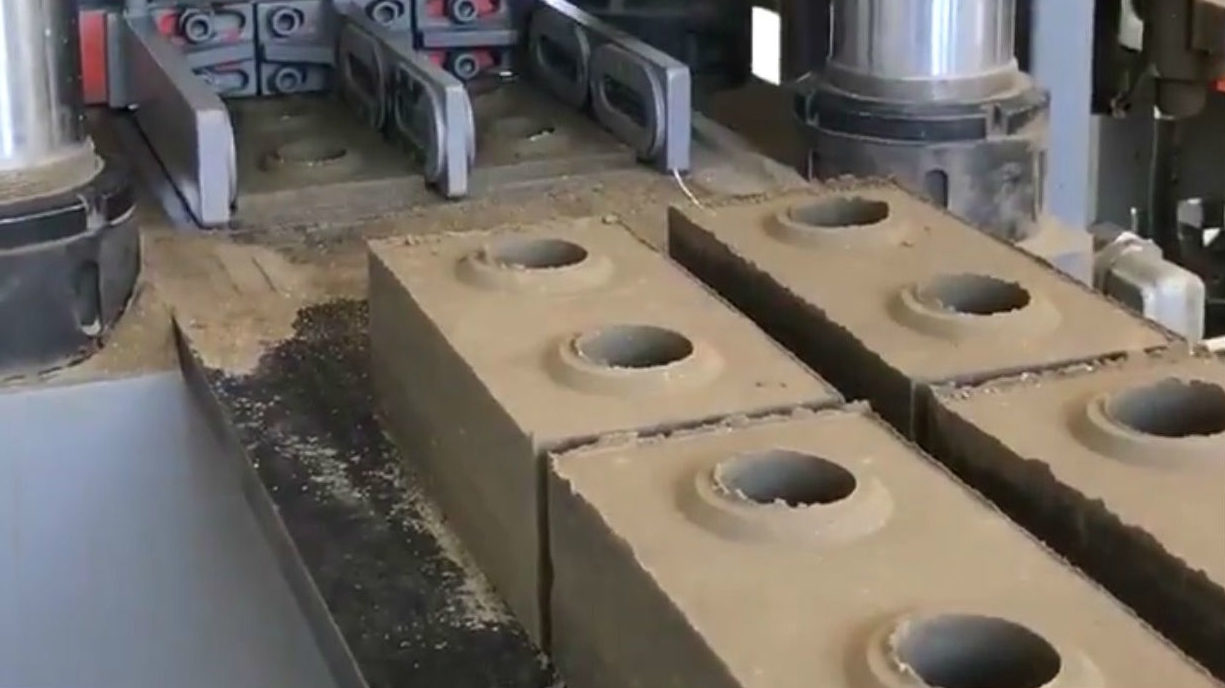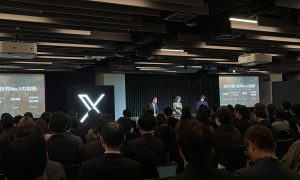

News
Musk’s Boring Company shares glimpse of Boring Bricks being produced
Just a bit over a week since teasing an image of a gantry that would be utilized for the downtown Chicago-O’Hare high-speed transit line, Elon Musk’s tunneling startup, The Boring Company, has uploaded a clip of its Boring Bricks being manufactured.
The short video of the Boring Bricks being produced showcases the unique characteristics of the bricks themselves, such as its slots that enable seamless interlocking. The recently-uploaded clip, while very brief, does give the impression that the production of the earth-made bricks is well underway.
Bricks! pic.twitter.com/6fNROJ86sN
— The Boring Company (@boringcompany) July 13, 2018
The Boring Company’s bricks were initially announced by Elon Musk back in March, when he stated that the new “merch” would be coming soon. The company had only finished selling its Not-a-Flamethrowers by this time, and Musk’s massive Twitter following was eager to see what product the tunneling startup would offer next. According to Musk when he announced the earth bricks, the Boring Bricks would be used to create models of sculptures and buildings. Considering that the blocks would be made from tunneling rock from the Boring Co’s projects, the products would also be rated for California seismic loads, making them incredibly durable.
While Musk at first noted that the bricks would be used to create garden-scale earth replicas of famous landmarks and buildings, it did not take long before one of the Tesla and SpaceX CEO’s followers on Twitter asked if the bricks could be used for low-cost housing projects. Musk promptly stated that the interlocking bricks would feature a surface finish, which would enable people to “build the outer walls of a small house in a day or so.”
By May, Musk reiterated his intentions to use the Boring Company’s bricks as material for affordable housing, and during the tunneling startup’s information session at the Leo Baeck Temple in Los Angeles, the interlocking earth bricks were revealed to the public. A sample of the Boring Brick was also used as a platform for Gary the Snail’s home, the Boring Company’s pet-slash-mascot-of-sorts, during the information session. Musk’s presentation further revealed images of the bricks being used as materials for a wall, as well as an Egyptian-themed model kit.
Apart from serving as materials for low-cost housing and model kits, the Boring Company is also looking at using the bricks for its tunnels. This particular idea has been outlined by the company in its FAQ for months, even before Musk announced the blocks on Twitter.
“The Boring Company is investigating technologies that will recycle the earth into useful bricks to be used to build structures. This is not a new concept, as buildings have been constructed from Earth for thousands of years including, according to recent evidence, the Pyramids. These bricks can potentially be used as a portion of the tunnel lining itself, which is typically built from concrete.”
The Boring Company recently won a high-profile contract to build a high-speed transport line connecting downtown Chicago to O’Hare airport. The project, which Musk expects will cost ~$1 billion, is expected to break ground within the next few months. The preparations for the transit line are already underway, with Chicago Mayor Rahm Emanuel recently traveling to the headquarters of the Department of Transportation in Washington, in order to discuss the upcoming project with DOT officials.
News
Tesla begins Robotaxi certification push in Arizona: report
Tesla seems serious about expanding its Robotaxi service to several states in the coming months.

Tesla has initiated discussions with Arizona transportation regulators to certify its driverless Robotaxi service in the state, as per a recent report from Bloomberg News. The move follows Tesla’s launch of its Robotaxi pilot program in Austin, Texas, as well as CEO Elon Musk’s recent comments about the service’s expansion in the Bay Area.
The Arizona Department of Transportation confirmed to Bloomberg that Tesla has reached out to begin the certification process for autonomous ride-sharing operations in the state. While details remain limited, the outreach suggests that Tesla is serious about expanding its driverless Robotaxi service to several territories in the coming months.
The Arizona development comes as Tesla prepares to expand its service area in Austin this weekend, as per CEO Elon Musk in a post on X. Musk also stated that Tesla is targeting the San Francisco Bay Area as its next major market, with a potential launch “in a month or two,” pending regulatory approvals.
Tesla first launched its autonomous ride-hailing program on June 22 in Austin with a small fleet of Model Y vehicles, accompanied by a Tesla employee in the passenger seat to monitor safety. While still classified as a test, Musk has said the program will expand to about 1,000 vehicles in the coming months. Tesla will later upgrade its Robotaxi fleet with the Cyercab, a two-seater that is designed without a steering wheel.
Sightings of Cybercab castings around the Giga Texas complex suggests that Tesla may be ramping the initial trial production of the self-driving two-seater. Tesla, for its part, has noted in the past that volume production of the Cybercab is expected to start sometime next year.
In California, Tesla has already applied for a transportation charter-party carrier permit from the state’s Public Utilities Commission. The company is reportedly taking a phased approach to operating in California, with the Robotaxi service starting with pre-arranged rides for employees in vehicles with safety drivers.
News
Tesla sets November 6 date for 2025 Annual Shareholder Meeting
The automaker announced the date on Thursday in a Form 8-K.

Tesla has scheduled its 2025 annual shareholder meeting for November 6, addressing investor concerns that the company was nearing a legal deadline to hold the event.
The automaker announced the date on Thursday in a Form 8-K submitted to the United States Securities and Exchange Commission (SEC). The company also listed a new proposal submission deadline of July 31 for items to be included in the proxy statement.
Tesla’s announcement followed calls from a group of 27 shareholders, including the leaders of large public pension funds, which urged Tesla’s board to formally set the meeting date, as noted in a report from The Wall Street Journal.
The group noted that under Texas law, where Tesla is now incorporated, companies must hold annual meetings within 13 months of the last one if requested by shareholders. Tesla’s previous annual shareholder meeting was held on June 13, 2024, which placed the July 13 deadline in focus.
Tesla originally stated in its 2024 annual report that it would file its proxy statement by the end of April. However, an amended filing on April 30 indicated that the Board of Directors had not yet finalized a meeting date, at least at the time.
The April filing also confirmed that Tesla’s board had formed a special committee to evaluate certain matters related to CEO Elon Musk’s compensation plan. Musk’s CEO performance award remains at the center of a lengthy legal dispute in Delaware, Tesla’s former state of incorporation.
Due to the aftermath of Musk’s legal dispute about his compensation plan in Delaware, he has not been paid for his work at Tesla for several years. Musk, for his part, has noted that he is more concerned about his voting stake in Tesla than his actual salary.
At last year’s annual meeting, TSLA shareholders voted to reapprove Elon Musk’s compensation plan and ratified Tesla’s decision to relocate its legal domicile from Delaware to Texas.
Elon Musk
Grok coming to Tesla vehicles next week “at the latest:” Elon Musk
Grok’s rollout to Tesla vehicles is expected to begin next week at the latest.

Elon Musk announced on Thursday that Grok, the large language model developed by his startup xAI, will soon be available in Tesla vehicles. Grok’s rollout to Tesla vehicles is expected to begin next week at the latest, further deepening the ties between the two Elon Musk-led companies.
Tesla–xAI synergy
Musk confirmed the news on X shortly after livestreaming the release of Grok 4, xAI’s latest large language model. “Grok is coming to Tesla vehicles very soon. Next week at the latest,” Musk wrote in a post on social media platform X.
During the livestream, Musk and several members of the xAI team highlighted several upgrades to Grok 4’s voice capabilities and performance metrics, positioning the LLM as competitive with top-tier models from OpenAI and Google.
The in-vehicle integration of Grok marks a new chapter in Tesla’s AI development. While Tesla has long relied on in-house systems for autonomous driving and energy optimization, Grok’s integration would introduce conversational AI directly into its vehicles’ user experience. This integration could potentially improve customer interaction inside Tesla vehicles.
xAI and Tesla’s collaborative footprint
Grok’s upcoming rollout to Tesla vehicles adds to a growing business relationship between Tesla and xAI. Earlier this year, Tesla disclosed that it generated $198.3 million in revenue from commercial, consulting, and support agreements with xAI, as noted in a report from Bloomberg News. A large portion of that amount, however, came from the sale of Megapack energy storage systems to the artificial intelligence startup.
In July 2023, Musk polled X users about whether Tesla should invest $5 billion in xAI. While no formal investment has been made so far, 68% of poll participants voted yes, and Musk has since stated that the idea would be discussed with Tesla’s board.
-

 Elon Musk1 week ago
Elon Musk1 week agoTesla investors will be shocked by Jim Cramer’s latest assessment
-

 Elon Musk18 hours ago
Elon Musk18 hours agoxAI launches Grok 4 with new $300/month SuperGrok Heavy subscription
-

 Elon Musk3 days ago
Elon Musk3 days agoElon Musk confirms Grok 4 launch on July 9 with livestream event
-

 News7 days ago
News7 days agoTesla Model 3 ranks as the safest new car in Europe for 2025, per Euro NCAP tests
-

 Elon Musk2 weeks ago
Elon Musk2 weeks agoA Tesla just delivered itself to a customer autonomously, Elon Musk confirms
-

 Elon Musk1 week ago
Elon Musk1 week agoxAI’s Memphis data center receives air permit despite community criticism
-

 Elon Musk2 weeks ago
Elon Musk2 weeks agoTesla’s Omead Afshar, known as Elon Musk’s right-hand man, leaves company: reports
-

 News2 weeks ago
News2 weeks agoXiaomi CEO congratulates Tesla on first FSD delivery: “We have to continue learning!”














